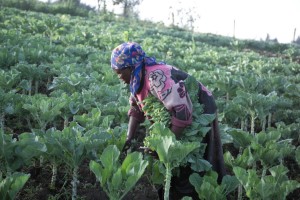A new report, “Growing a Better Future,” has the ethanol industry up in arms over its accusation that U.S. biofuel policy is leading to world hunger. The report kicked off a new worldwide GROW campaign spearheaded by the organization. The report covers the symptoms of today’s broken food system: growing hunger, flat-lining yields, a scramble for fertile land and water, and rising food prices while the GROW campaign attempts to overcome these issues.
The report predicts that the price of food, already at a record high, will more than double in the next 20 years. In addition, by 2050, demand for food will rise 70 percent, yet the report says the world’s capacity to increase food production is declining. A contributor to these issues: global climate change and pro biofuel policies throughout the world.
 “Our world is capable of feeding all of humanity yet one in seven of us are hungry today,” said Jeremy Hobbs, Executive Director of Oxfam. “In this new age of crisis, as climate change impacts become increasingly severe and fertile land and fresh water supplies become increasingly scarce, feeding the world will get harder still. Millions more men, women and children will go hungry unless we transform our broken food system.”
“Our world is capable of feeding all of humanity yet one in seven of us are hungry today,” said Jeremy Hobbs, Executive Director of Oxfam. “In this new age of crisis, as climate change impacts become increasingly severe and fertile land and fresh water supplies become increasingly scarce, feeding the world will get harder still. Millions more men, women and children will go hungry unless we transform our broken food system.”
Both Growth Energy and the Renewable Fuels Association acknowledge that Oxfam is partially correct in their identifying the role that high oil prices and international trade have on the price of corn. However, they diverge with the report on biofuels being a cause of starving “millions of people” as the report purports.
“Oxfam is wrong to propose ending the Renewable Fuel Standard or the biofuels tax credit, as these are the most effective policies we have to displace oil – a primary driver of rising grocery prices,” said Jim Nussle, Growth Energy President. “It is unfair and erroneous to single out ethanol for high food prices, especially because the U.S. ethanol industry uses just three percent of the global grain supply on a net basis.”
RFA President Bob Dinneen highlighted the significant improvements in agriculture over the past few decades and called for more widespread adoption of improved agricultural practices worldwide. “The same opportunities at varying scales are available to farm communities in developing nations. Together with improved farming technologies, local biofuel production can provide developing rural economies with the kind of economic prosperity needed to become more food secure,” concluded Dinneen.

